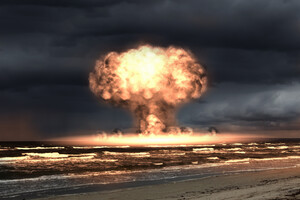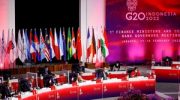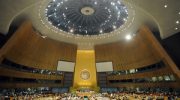The risk of this is small, but it is there.

Threat of nuclear war existed against the background of Russia's invasion of Ukraine for more than seven months, and in the last few weeks it has become even more difficult to disconnect from it. In a televised speech, President Vladimir Putin warned that if Western powers threaten the “integrity” of Russian territory, which, according to Putin, may now include four illegally annexed regions of Ukraine, “we will certainly use all the means at our disposal orders”. He added: “This is not a bluff.”
Ukrainian intelligence believes that there is a “very high” risk that Russia could use so-called tactical nuclear weapons. US officials say the risk remains low and they see no signs of nuclear mobilization. But they are much more concerned about that possibility than they were at the start of the conflict and have begun to think through post-strike scenarios. Spencer Bokat-Lindell in The New York Times ponders how the world should react if Putin does use nuclear weapons.
“Catastrophic consequences”
In response to Putin's speech, the advisor President Biden's national security adviser, Jake Sullivan, said that any use of nuclear weapons would have “catastrophic consequences” for Russia, which he “outlined” in private communications with Moscow.
The public does not know exactly what these consequences will be. One option would be for the United States to respond with a tactical nuclear strike of its own. As Matthew Kroenig of the Atlantic Council writes, “A nuclear response is likely to increase the deterrence of adversaries, build confidence among allies, and restore the global taboo on the use of nuclear weapons in the future by demonstrating that countries cannot use nuclear weapons without dire consequences.” Otherwise, he added, “both allies and adversaries may be surprised or feel weak”. The White House, however, has said for months that there are almost no scenarios in which the U.S. would respond with nuclear weapons, and for good reason: As Krenig points out, while U.S. nuclear retaliation could restore the nuclear taboo, it could also start a cycle of mutual escalation that ends in full-scale nuclear war.
Less remote are the chances of other military responses, such as using conventional weapons against the site from which the nuclear strike was launched, or arming Ukrainian forces to do so. Former CIA Director David Petraeus recently suggested that the Biden administration would lead NATO in a collective military effort aimed at “withdrawing all Russian conventional forces that we can see and identify on the battlefield in Ukraine as well as in Crimea , and all the ships in the Black Sea”.
But even a conventional military response — which, it should be noted, is likely to be conducted without congressional approval — would lead to a direct confrontation between Russia and NATO, “and therefore creates the risk of World War III with Armageddon,” argues Andreas Kluth in Bloomberg. – Putin may conclude that the US is not ready to respond with nuclear weapons and launch even more nuclear strikes.”
Read also: Bloomberg: Russia will not be able to quickly launch a tactical nuclear strike on Ukraine, the reason given >
Economic war
Russian officials appear to believe they can deploy nuclear weapons in Ukraine without exposing themselves to the high risk of military retaliation from NATO. “Overseas and European demagogues are not going to die in a nuclear apocalypse,” wrote Dmitry Medvedev, the deputy chairman of Putin's Security Council, “Therefore, they will swallow the use of any weapon in the current conflict.”
Despite the severity of sanctions against Russia, Eliot A. Cohen, a professor at Johns Hopkins University's School of International Studies, argues that Ukraine's allies still have economic arrows in their quiver. Specifically, he said, the U.S. could impose unlimited secondary sanctions on anyone doing business with Russia and take steps to confiscate roughly $300 billion that Russia has in foreign accounts. Ukraine's allies have also capped the price of Russian oil to further squeeze the Russian economy.
Some analysts believe that capping oil prices can only be successful if major oil buyers such as China and India, which have not joined the sanctions against Russia, cooperate. However, if Putin broke the nuclear taboo, that could well change: “The whole world would grind to a halt,” said Joseph Cirinchone, a nuclear expert at the Quincy Institute for Responsible Government.
Also read: Institute for the Study of War finds another a sign that nuclear threats from Russia are a bluff
Some analysts doubt that expanded sanctions and military support will be enough to break it or restore the nuclear taboo. “Moscow would be able to avoid using nuclear weapons, demonstrate that deterrence is pointless, and set itself up to use nuclear weapons again in the future,” writes Dan Goure, vice president of the Lexington Institute, a public policy think tank. – Putin's fate at home would certainly improve. He would declare that he is a Russian leader who stood up to the West and got away with using nuclear weapons to defend the homeland.”
The negotiation window is closing. Will nuclear detonation open or close it?
Ukraine is “ready for dialogue with Russia”, Zelenskyi said last week, but, he added, only “with another president of Russia.” For many, his determination is more than justified: “Russia's atrocities on the Ukrainian lands they occupied are well documented,” writes Daniel Fried, former US ambassador to Poland. – Murders, rape, abduction of children and eradication of Ukrainian culture – this is a notebook. This reality should set a high bar for any settlement that surrenders Ukrainian land or people to Russia.”
It is difficult to predict whether a nuclear strike will break this diplomatic impasse or strengthen it. Faced with calls to do everything possible to prevent further bloodshed and nuclear escalation, Ukrainians could reasonably argue that a settlement with Russia would justify a new imperial warfare strategy that Putin and others should reconsider.
Read also: US doubts Putin will use nuclear weapons, but acknowledges growing threat – CNN
On the other hand, the world may perceive Russia's violation of the nuclear taboo as a terrible and desperate code for its national decline under Putin: it will become truly a global pariah, and any face he might have saved through de-escalation will be lost.
Related video
“More than seven months of optional war destroyed the Russian army, sank the Russian economy, weakened Russia's partnership with China, alienated Russia's trading partners and forced the best and brightest Russians to flee the troubled country,” writes David Von Drele in The Washington Post. – The case for negotiations is that the agreement can create space for Russia to deflate, not explode.”
See special topic: More than three billion on prostheses: how the authorities work on the rehabilitation of the military The existing mechanism requires refinement. Ukraine's NATO priority now should be weapons, not quick membership — Atlantic Council For now, Ukraine should focus on what it can get. RF trophy equipment constitutes a significant part of Ukraine's military arsenal – British intelligence With the occupiers under serious pressure in several sectors, the Russian Federation is likely to continue to lose heavy weapons. RF troops hit the Nikopol district six times with anti-aircraft missiles and heavy artillery – the head of the OVA According to preliminary data, no people were injured. Why territorial defense is not really territorial: the expert named all the problems of the Law on TrO And the use on the front lines of the DFTG threatens with negative consequences for the authorities themselves, because it can lead to massive desertions, low morale and public accusations against the Ukrainian military command.


